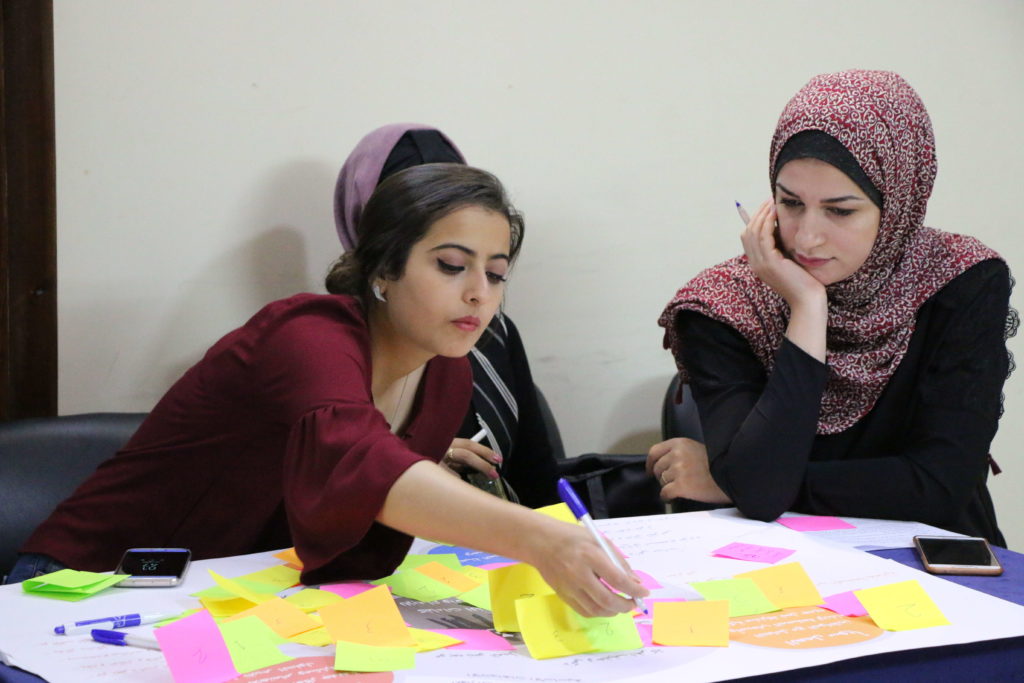Three ways to advance women’s participation in Palestine
Wide consultations with Palestinian women actors highlight the need to recognise the diverse realities of women coming from different Palestinian communities. Despite the differences, it is also important to acknowledge the common challenges Palestinian women face in their daily lives, such as the Israeli occupation and the patriarchal system. On the occasion of the International Women’s Day, we want to share insights from the consultations conducted by CMI and Masarat in June-December 2020.

Participants of the Peace Innovation Challenge in Palestine in 2018.
In Palestine, there is no single Palestinian feminist discourse, rather there are diverse voices and movements of Palestinian women – both old and new.
Between June-December 2020, CMI and Masarat (The Palestinian Center for Policy Research & Strategic Studies) consulted a range of different Palestinian women actors. The participants represented civil society, diverse political affiliations and independent women activists from the Gaza Strip, West Bank and other areas. Specific efforts were made to include also young Palestinian women to ensure broad representation among the different women actors.
The participants in the consultations stressed that the realities of women in different Palestinian communities should be recognised, but that it is also important to identify the connections between various issues and common challenges so as to enhance collective efforts.
The unifying issues identified by the participants regarding gender equality in Palestine included the occupation and the patriarchal system, both of which affect the daily lives of women in many ways, and inhibit women’s full potential and keep them marginalized from decision-making. There are also attacks on women politicians and civil society actors and growing hate speech, as well as a backlash against the rights of women. The most recent example of this is a court decision that would have prevented unmarried women traveling from the Gaza Strip without the consent of a male guardian. But following widespread criticism and lobbying the decision was revised.
Here are three key recommendations from the consultations:
1) Emphasising the role of young women
There is a need to foreground the role of young Palestinian women and include more young women actors and women from the grassroots in the dialogue in Palestinian society. Even though Palestinian women have throughout Palestinian history been politically active, and there are many women actors and organisations with established status in national politics, young women in particular are marginalized from the national political sphere. The lack of space for political participation through official structures has resulted in women finding new ways to take action through grassroots activism. It is important to support these new actors to take part and influence the national discussion, and to enhance their ability to create change.
2) Importance of supporting women’s participation in politics
As general elections are scheduled to take place in Palestine in 2021 – after 15 years – it was highlighted that it is important to support women in taking an active role in the electoral process, and to bring women candidates and women from parliament for discussions across the party lines. The political parties, both in their actions and in their programmes, have not rigorously pushed for gender equality. Because electoral contexts can be important moments for introducing new agendas and forging new political practices, it was emphasised that it is essential to influence the positions of the parties. This includes getting questions related to women’s rights onto their programmes and ensuring that the commitments related to women’s rights are adhered to.
3) Discussion on women’s rights and social justice should not be separated
It is important to highlight and recognise that women’s rights are an integral part of a just society, and that the discussion on women’s rights and social justice should not be separated. Many participants noted that in present-day Palestinian society, it is difficult to develop social rights, despite the fact that equality and social justice are referenced in the 1988 independence declaration. For many of the Palestinian women who were consulted — and as with activists in other countries worldwide — guaranteeing equal social and political rights and ensuring accountability should be at the heart of the state’s project of inclusion.
Read more here on how to advance women’s participation in Palestine. On the occasion of International Women’s Day, we interviewed two young Palestinian female activists , who share their views on how to bring about change.